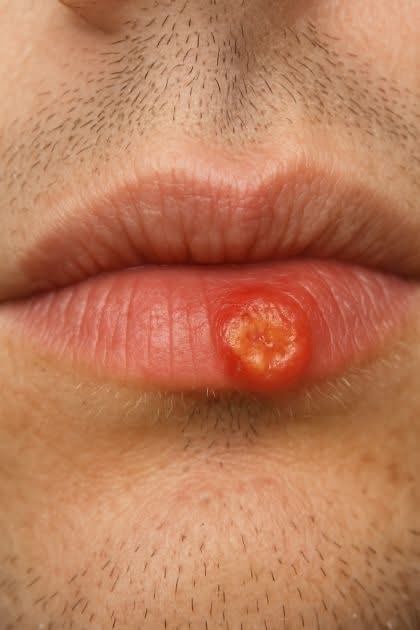
Dealing with a lip sore that just won’t heal can be both frustrating and concerning. It’s a problem many people face, as a variety of factors—like weather changes, certain foods, or stress—can lead to sore or irritated lips. However, if you’ve had a crusty sore that sticks around and refuses to go away, it may be a sign of something more serious.
In today’s world, getting a quick doctor’s appointment isn’t always easy, but it’s still important to know what could be behind a lingering sore. Long wait times can make it tough to get answers, so understanding the potential causes on your own is a helpful first step. This article breaks down why a lip sore might not heal, explores home remedies you can try, and explains when it’s time to seek medical attention.
Why Some Lip Sores Don’t Go Away
A sore on the lip that lingers for more than a couple of weeks should raise a red flag. Most minor irritations or cuts usually heal in just a few days. When healing doesn’t happen, it could point to a deeper health issue. Because the skin on your lips is delicate, it’s especially vulnerable to irritation and infection.
Lip sores can look different depending on the cause—some may be red and inflamed, others crusty or scabby. Paying close attention to how the sore changes in appearance or feels (such as pain, swelling, or itching) can help determine what’s going on.
Common Causes of Lip Sores That Don’t Heal
There are several potential culprits behind a lip sore that won’t improve. While some causes are harmless and respond well to self-care, others require a medical diagnosis and targeted treatment. Here are the most common reasons:
Cold Sores (Herpes Simplex Virus)
Cold sores, or fever blisters, are caused by the herpes simplex virus (HSV). They often appear as small clusters of blisters that are painful, fluid-filled, and eventually crust over. Triggers like stress, illness, or sun exposure can bring them on.
They usually go away within two to four weeks, but for some people, outbreaks are frequent or the sore becomes infected and takes longer to heal. Antiviral medications can help manage symptoms and reduce how often they come back, but they don’t eliminate the virus from your body.
Allergic Reactions and Irritants
Your lip sore could also be the result of an allergic reaction or exposure to irritating substances. Lip balms, cosmetics, toothpaste, and certain foods can all cause contact dermatitis, leading to red, itchy, or swollen lips. Identifying and removing the irritant is the first step toward healing. Switching to products labeled “hypoallergenic” may help prevent further flare-ups.
Bacterial Infections
Some lip sores are bacterial, like those caused by impetigo—a highly contagious skin infection. These sores usually ooze, then form a yellowish crust. Bacterial infections typically require antibiotics to clear up, so it’s important to seek medical care if you suspect this is the case. Good hygiene and avoiding contact with infected individuals can help stop the spread.
Could It Be Skin Cancer?
While rare, non-healing sores on the lips may indicate squamous cell carcinoma, a form of skin cancer. These sores may look like a persistent scaly patch, a raised bump, or a sore that bleeds easily and doesn’t go away. Risk factors include excessive sun exposure and smoking. If you notice a sore that changes in size, shape, or doesn’t heal, it’s important to see a doctor. A biopsy might be necessary to rule out cancer.
Other Less Obvious Causes
Autoimmune Conditions: Diseases like lupus or pemphigus vulgaris can cause stubborn mouth and lip sores due to the immune system attacking healthy tissue. Blood tests and a physical exam are often used for diagnosis, and treatment usually includes immune-suppressing medication.
Vitamin Deficiencies: Lack of key nutrients—especially B vitamins (like B2, B3, or B12)—can lead to issues like angular cheilitis, which causes painful cracks at the corners of your mouth. Improving your diet or taking supplements may help, but a medical evaluation can confirm whether a deficiency is the cause.
At-Home Remedies That May Help
Many people turn to natural or over-the-counter remedies to treat lip sores. Some commonly used options include:
Aloe vera – Known for its soothing properties.
Honey – Has natural antibacterial benefits.
Coconut oil – Helps moisturize and may reduce irritation.
Cold compress – Can help reduce inflammation and numb pain.
Over-the-counter antiviral creams (like docosanol) can help treat cold sores, while antibiotic ointments may be effective for bacterial infections. Always follow product instructions carefully, and consult a pharmacist if you’re unsure what to use.
When to See a Doctor
If your sore doesn’t improve after trying basic care and over-the-counter treatments, it’s time to seek professional help. A healthcare provider can perform a physical exam and may run tests to determine the cause.
Even if it takes time to get an appointment, don’t give up. Look into walk-in clinics or telehealth options if they’re available in your area. Early diagnosis is important—it can mean faster healing and a lower risk of complications.
Have You Tried Any Remedies Yet?
Lip sores can be tricky and frustrating to deal with—especially when they linger. What have you tried so far to help the sore heal? Sharing your experience might help you get better advice or even help someone else going through the same thing